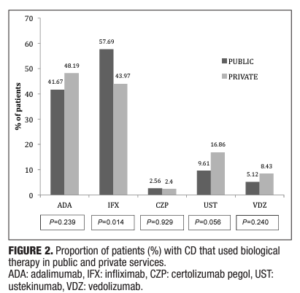HIGHLIGHTS
- In a tertiary IBD center in Latin America:
- More than half of the patients had been submitted to one or more CD-related abdominal surgical procedure.
- Between the two healthcare systems, there was no difference in the rates of use of biological therapy in patients with CD, and in UC related hospitalizations.
- Biologics were prescribed almost twice as often in the private system as compared to the public in patients with UC.
ABSTRACT – Background –
Inflammatory bowel diseases (IBD) have rising incidence and prevalence rates globally. In IBD, there are scarce stu dies comparing differences between patients according to socioeconomic status. Objective – Our aim was to comparatively evaluate hospitalizations, use of biologics and rates of surgery in patients with IBD between public and private healthcare systems. Methods – Single-center retrospective cohort study in patients with IBD from a tertiary referral unit from Latin America, between 2015 and 2021. CD and UC patients were classified into two subgroups: public and private systems. Demographic characteristics, hospitalizations, need for surgery and biologics were compared. Results – A total of 500 patients were included, 322 with CD and 178 with UC. CD-related hospitalizations were frequently observed in both healthcare systems (76.28% in private and 67.46% in public). More than half of the patients had been submitted to one or more CD-related abdominal surgery, with no significant difference between the subgroups. Although there was no difference in the rates of use of biological therapy in CD subgroups, infliximab was more used in the public setting (57.69% vs 43.97%). There was no difference in UC-related hospitalizations between the subgroups (public 30.69% and private 37.66%) as well as the rates of colectomy (public: 16.83%, private: 19.48%). Biologics were prescribed almost twice as often in private as compared to public (45.45 vs 22.77%). Conclusion – There were no differences in the rates of hospitalization and abdominal surgery between the systems. In patients with UC, there was greater use of biological therapy in the private healthcare setting.
AUTORES
Patrícia ZACHARIAS, Daniéla Oliveira MAGRO, Milena PERUSSOLO, Fernanda da Silva Barbosa BARAÚNA and Paulo Gustavo KOTZE.


